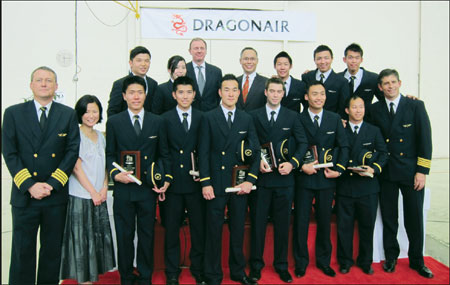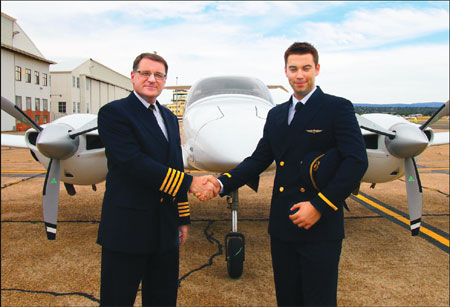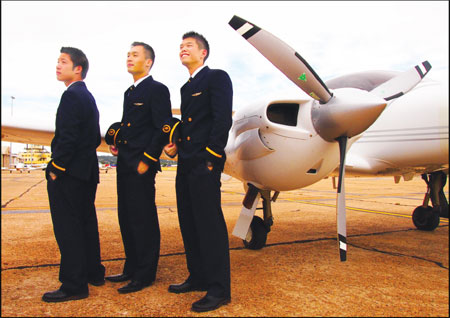Aiming for the sky
Updated: 2012-01-06 07:08
By Ming Yeung(HK Edition)
|
|||||||
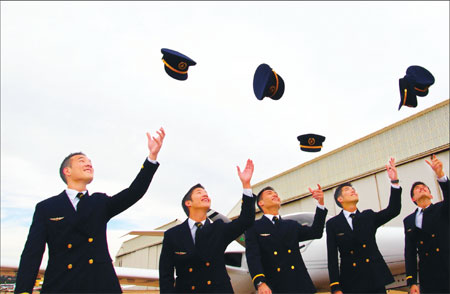
|
Dragonair cadets share a relaxed moment with company managers at the graduation ceremony after 14 months of hard training. Provided to China Daily |
|
Captain Marcus De Santis (left) is happy that his son Luke De Santis follows his path to becoming a pilot. Ming Yeung / China Daily |
|
Alex Wong (left), Michael Chow (center) and Sean Wong say the friendship is what makes them endure the 14-month stressful trainng ordeal. Ming Yeung / China Daily |
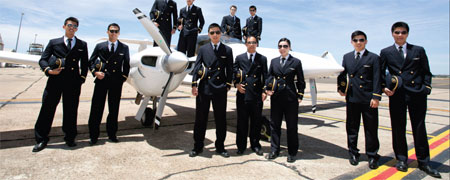
Many young people aspire to fly in the cockpit of an airplane. For most youngsters, the HK$1 million price tag for pilot training makes it an impossible dream. But for candidates who are truly qualified, there is a way to fly high. Ming Yeung reports.
It's pretty cool having a dad who's a pilot. And for the dad, it can be pretty satisfying when your kid follows in your footsteps to become a pilot too.
Captain Marcus De Santis will never forget the day when he pinned the wings on his son's uniform and handed over the certificate at the young man's cadet graduation ceremony, in which he was initiated as a qualified pilot.
Marcus was especially proud that his 88-year-old mother also attended his son's graduation, after witnessing his own 35 years ago.
Luke De Santis, 23, is no stranger to the aviation industry. He's seen his dad fly countless hours. Air travel news is a frequent topic at home. But it wasn't until he and his schoolmates were on a flight to Guilin, piloted by his father, that Luke decided he wanted to be a pilot one day.
When his father's voice came over the speakers, with an in-flight announcement, Luke turned to his friends, with a broad smile on his dimpled face and proclaimed, "This is my papa!"
Luke majored in corporate finance at university. Then he went to work at investment bank. That was all he needed to satisfy himself that he didn't want to be a banker.
Luke applied for entry into Dragonair's pilot-training program. Marcus, a strict dad anyway, as well as a great mentor, bombarded Luke with questions far beyond his immediate knowledge at the time.
Long before he made up his mind to apply, Luke had been given chances to see what aviation was all about, through the Dragonair Aviation Certificate Programme (DACP) - a program that aims to nurture aviation professionals in all areas.
"My dad told me 'if you wanna get into it, you get into it with a clear mind,'" Luke recalled.
Luke finally succeeded after several rounds of interviews and began a daunting, 14-month pilot training program at Adelaide Flight Training Centre in Australia. Joining him were 10 other aspiring cadet pilots.
Captain Marcus has been flying Dragonair for more than two decades. He is regarded as "Godfather" among those who took part in DACP because he devoted much time and effort to help these local young people achieve their dreams of flying high.
"At DACP, you can't do the interview with people, all you do is show people the direction and expectations, say this is what you need to get the job and how you get that, and identify a person's weakness," he stated.
To be a pilot is understandably a faraway dream for many youths. Often the will is there but the means are not.
Three close buddies - Michael Chow, 23, Alex Wong 24, and Sean Wong, 23 - used to dream of all becoming pilots one day. They were utterly demoralized by the hard reality that it would cost more than HK$1 million if they took up pilot training on their own. What made the prospects even more daunting, after burdening themselves with huge debt, they were not guaranteed a job once they graduated.
Their hopes lit up for the three Aeronautical Engineering students at Imperial College when they heard that Dragonair was recruiting flight crews. All three applied straight away. During the course, they were called upon to fly back and forth between London and Hong Kong four or five times to complete their interviews.
"It's pretty much like a computer game. If you score well, you get to the next stage. Between us, it was like a competition," Michael conceded.
Even if it was a competition, it was surely a healthy one. The three tested each other and honed their interview skills.
"At that stage, we fed off each other's energy. I was thinking, 'if I'm not gonna make it, I wanna see you two make it'," Sean said.
The three "brothers", through intense study of material they often found mind-boggling and much more difficult than they had expected, all reached the final stage, and at last, graduated together.
Professionals tend not to change careers once they have meticulously pursued another hard-won profession. But Nick Chan, 25, had started his working life in architecture, didn't regret giving up his well-paid job to pursue his lifelong dream of becoming a pilot.
After failing Cathay Pacific's pilot interview just before the flight-grading stage he kept trying. Nick determinedly attended aviation courses while working at an architectural firm.
Nick decided to give one more shot at applying to become a pilot. His increased knowledge and self-confidence carried him through, lending him new abilities he did not have at his first go-round.
Cadet Poon Siu-chung, 24, comes from a family of lawyers. But his love of aircraft since childhood diverted him from the "family business".
Poon liked the sky too much. "There's something about being in the sky that gives me an awesome feeling which is hard to describe," he said. "And obviously you get the benefit of going to foreign lands and seeing the bases. The view from your 'office' is different every day due to weather changes and this adds to the challenge which should make it more interesting than being a lawyer."
He is fortunate to have a supportive father, who saw the pilot recruitment advertisement first and faxed it to his son, who was studying in Singapore at the time.
When Poon got a call from Dragonair inviting him to come to Hong Kong for an initial test, his father simply said, "All right, just go for it, here's my credit card number."
Poon used the credit card a couple of times to book flights to attend various stages of the interview process over a six-month period.
With an agenda involving 65 written exams over 60 weeks, more than 220 hours of flying, and 100 hours in an aircraft simulator, the pilots in training hardly have time to relax so they often hit the gym together to let off steam.
Demanding instructors are unconcerned about how busy or exhausted the student pilots were while flying. They shouted instructions over the engine roar in the tiny planes which have no air-conditioning. "It's like having interviews in saunas," Michael said.
There were moments all trainees felt that they would probably drop out.
"Sometimes when you are here for so long, you start to lose track of why you are here," Alex admitted. "When management comes down, they remind you that you are a Dragonair cadet pilot. This is what keeps all of us going."
In the end they completed their ordeal coming away with a wealth of new skills and memories to take with them into their future flying careers.
"Sometimes when you are up in the air, it's not just about flying, it's about yourself under very stressful conditions where things could be out of control," Michael stressed.
Training for the DA-12 class flyboys and one flygirl is not over yet. They still face extended training back in Hong Kong.
"Upon successful completion of the training in Adelaide, the cadets return to Hong Kong and attend an extended course at the Company Flight Training Centre. This course teaches them to fly and operate the Airbus aircraft; and consists of a mixture of computer-based training packages together with many hours in Dragonair's own Airbus full-flight simulator and flying training in the aircraft. This extended course normally takes about 3 months," spokesman Captain Peter Sanderson, Dragonair's general manager for operations, told China Daily.
As global air traffic continues its rapid expansion, airlines face a growing shortage of qualified cockpit crews.
Based in Hong Kong, the carrier only offers sponsorship for pilot training to Hong Kong residents. It's one of the few ways most young people in Hong Kong can fulfill their dream of flying, since the alternative is 60 weeks of training with costs that could go higher than HK$1 million.
"The current Cadet Pilot Programme began in 1999. Over the years, more than 70 local pilots have received training through the sponsorship of Dragonair," Sanderson added. "Cadets are required to work as pilot on Dragonair for at least five years after they complete the training program."
Grace Lee, Drangonair's head of corporate communication, revealed that the airline suspended the cadet program in 2009 as a result of the global economic turmoil but admitted that the company has learned the lesson. The one-year program hiatus did hinder the company's development.
"The aviation industry has gone through a huge change over the past decade. Traveling for business and pleasure has become common to the public. Because of a year's suspension, we experienced a shortfall of pilots when the economy went up," Lee said.
Dragonair plans three classes in 2012 which the company expects will meet the needs of its workforce at the junior level.
Caption Marcus has a few words for aspiring pilots. "Do not prepare to pass the interview. Prepare to keep the job."
The father-and-son pilots hope to sit in the same cockpit one day. "I'm hoping eventually that I'll get the chance to fly with my dad," Luke said.
Of course, Marcus agreed, "That's gonna be a high point of my career."
(HK Edition 01/06/2012 page4)
